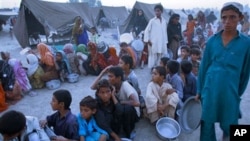The United Nations says more than 27 million people are displaced within more than 50 countries around the world as a result of armed conflicts. At least half this group - more than 13 million - are children. The world body is introducing guidelines to help governments and humanitarian agencies protect and provide for this group's special needs.
In the late 1990s, when Alima was 10 years old, her family fled their middle class life in the Afghan city of Mazar-e-Sharif because of the growing threat from the Taliban. First they settled in the capital, Kabul.
Alima, now 21 years old, recounts what life was like there. "I remember going to first grade for a few months, and then I couldn't go anywhere because the schools were bombed and there was no schools to go to, and then my mom wouldn't let me go because the Taliban would kidnap people and rape people, especially for me being a girl," she said.
But when it became apparent that the situation was deteriorating, Alima's parents and their eight children sought refuge in neighboring Pakistan.
"When we moved to Kabul it was like going from middle class to almost homeless. We had no food, no electricity, no nothing," Alima says, "It was really hard. I thought that was the worst it could get, and then we moved to Pakistan, and we were actual homeless. We didn't have any food, no money."
With help from a resettlement program, Alima's family eventually came to the United States. They arrived just months before the September 11th terrorist attacks. Alima said it was difficult not knowing any English, and after September 11th she felt discriminated against because she was Afghan. But despite these obstacles, she has adjusted to life in her adopted country. Today she is in her third year at the University of Washington where she hopes to become a pharmacist.
Thirty-two year old Joseph has a much different story.
He grew up in south Sudan and at the age of seven saw his family ripped apart during that country's long and bloody civil war. Joseph was separated from his mother and lived with soldiers from the Sudan People's Liberation Army or SPLA.
"Basically SPLA was like my parent to me," Joseph said.
He spent his childhood on the front lines of battle and wandering among camps for the internally displaced. He had no education and survived at times on next to nothing. "I begin to survive by hunting rats and bats, and that's the life that I have been living," he added.
Joseph says he saw things no child should ever witness. "The thing I have seen is killing of innocent people, which happened everywhere between the Sudan government and the SPLA," he said.
Life began to improve for Joseph when he went to a U.N.-administered displaced persons camp. There he became part of a resettlement program and in July 2001, he came to the United States. He hopes to graduate from the university next year with a degree in criminal justice.
But life has not been easy. Joseph was briefly reunited with his father in 1989, but has not seen his mother or sisters for 25 years. After the Sudanese civil war ended in 2005 they were able to reestablish contact, but he lacks the resources to visit them and fears for the political situation since they are southerners living in the country's Arab north.
The United Nations is working to improve the situation of children like Alima and Joseph who are displaced during armed conflicts with the introduction of rights and guarantees. The U.N. hopes these guidelines will be adopted by governments, humanitarian agencies and other actors.
Radika Coomaraswamy is the U.N. Secretary-General's Special Representative for Children and Armed Conflict. She says displaced children are some of the most invisible and vulnerable children in the world and governments need to step up and take care of them.
"What we see increasingly is whenever there is some kind of conflict or disaster, states seem to now abdicate and say the U.N. can handle that. That should not be," Coomaraswamy says, "States bear primary responsibility. The mark of sovereignty is that you will protect your civilians and your citizens. We want to say that they must take a much greater role. We are there to support them, not to be the only actor."
The guidelines are basic. Children must have the same rights and freedoms as those not displaced. Their best interests must be a primary consideration. They are entitled to fundamental needs such as an adequate standard of living and the right to physical security and protection from such threats as sexual violence, trafficking and forced prostitution.
The U.N. is also pressing governments to keep displaced families together, to make sure these children continue to receive an education, and get psychosocial support if they need it.
Now a father himself, Joseph says he will make sure his daughter never lives the life he did. He says he hopes her childhood will be much different and happier than the one that was stolen from him.




